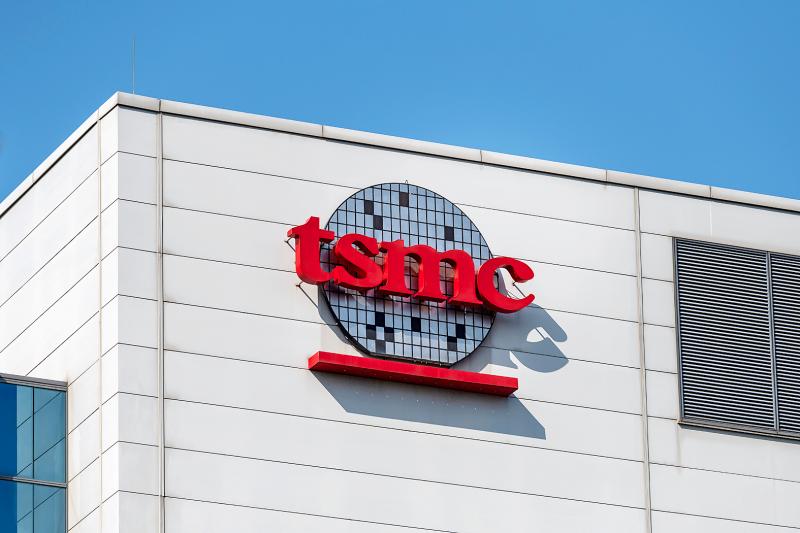Taiwan Semiconductor Manufacturing Co (TSMC, 台積電) is planning to build several more chipmaking fabs in the US state of Arizona beyond the one already planned, three people familiar with the matter said.
TSMC, the world’s largest contract chipmaker, announced in May last year that it would build a US$12 billion fab in Arizona.
The 12-inch wafer fab in Phoenix is expected to start mass production in 2024, the Investment Commission said in December, when it approved the plan.

Photo: Billy H.C. Kwok, Bloomberg
Three sources familiar with the matter, speaking on condition of anonymity as they were not authorized to speak to the media, said that up to five additional fabs are being planned for Arizona.
The initial fab is relatively modest by industry standards, with a planned output of 20,000 wafers per month using the company’s most sophisticated 5-nanometer process technology.
It is not clear how much additional production capacity and investment the additional fabs might represent, and which process technology they would use.
TSMC last month said it planned to invest US$100 billion over the next three years to increase production capacity, although it did not give details.
One person with direct knowledge of the matter said that the expansion was in response to a request from the US, but declined to provide further details.
“The United States requested it. Internally TSMC is planning to build up to six fabs,” the person said, adding that it was not possible to give a timeframe.
US President Joe Biden’s administration is preparing to spend tens of billions of US dollars to support domestic chip manufacturing. Under existing legislation, foreign firms are eligible for those funds, but whether they will ultimately receive them is an open question.
A second person familiar with the plans said that TSMC had already made sure there was enough space for expansion when it obtained the land for the first fab.
“It’s so they can build six fabs,” the source said.
The third person, from a TSMC supplier involved in the Arizona project, said TSMC had told them the plan was to build a total of six fabs over the next three years.
Reuters was not able to independently confirm the timeframe.
TSMC referred to comments by CEO C.C. Wei (魏哲家) on an earnings call last month, saying that it was starting chip production in Arizona in 2024, deploying 5-nanometer technology to produce 20,000 wafers per month.
“We have acquired a large piece of land in Arizona to provide flexibility. So further expansion is possible, but we will ramp up to phase one first, then based on the operation efficiency and cost economics, and also the customers’ demand ... decide what the next steps” would be, the company said.
Asked whether the planned expansion was because of a request from the US, TSMC said: “Once there is any official decision, we will disclose it accordingly.”

WAITING GAME: The US has so far only offered a ‘best rate tariff,’ which officials assume is about 15 percent, the same as Japan, a person familiar with the matter said Taiwan and the US have completed “technical consultations” regarding tariffs and a finalized rate is expected to be released soon, Executive Yuan spokeswoman Michelle Lee (李慧芝) told a news conference yesterday, as a 90-day pause on US President Donald Trump’s “reciprocal” tariffs is set to expire today. The two countries have reached a “certain degree of consensus” on issues such as tariffs, nontariff trade barriers, trade facilitation, supply chain resilience and economic security, Lee said. They also discussed opportunities for cooperation, investment and procurement, she said. A joint statement is still being negotiated and would be released once the US government has made

NEW GEAR: On top of the new Tien Kung IV air defense missiles, the military is expected to place orders for a new combat vehicle next year for delivery in 2028 Mass production of Tien Kung IV (Sky Bow IV) missiles is expected to start next year, with plans to order 122 pods, the Ministry of National Defense’s (MND) latest list of regulated military material showed. The document said that the armed forces would obtain 46 pods of the air defense missiles next year and 76 pods the year after that. The Tien Kung IV is designed to intercept cruise missiles and ballistic missiles to an altitude of 70km, compared with the 60km maximum altitude achieved by the Missile Segment Enhancement variant of PAC-3 systems. A defense source said yesterday that the number of

‘CRUDE’: The potential countermeasure is in response to South Africa renaming Taiwan’s representative offices and the insistence that it move out of Pretoria Taiwan is considering banning exports of semiconductors to South Africa after the latter unilaterally downgraded and changed the names of Taiwan’s two representative offices, the Ministry of Foreign Affairs (MOFA) said yesterday. On Monday last week, the South African Department of International Relations and Cooperation unilaterally released a statement saying that, as of April 1, the Taipei Liaison Offices in Pretoria and Cape Town had been renamed the “Taipei Commercial Office in Johannesburg” and the “Taipei Commercial Office in Cape Town.” Citing UN General Assembly Resolution 2758, it said that South Africa “recognizes the People’s Republic of China (PRC) as the sole

Taiwanese exports to the US are to be subject to a 20 percent tariff starting on Thursday next week, according to an executive order signed by US President Donald Trump yesterday. The 20 percent levy was the same as the tariffs imposed on Vietnam, Sri Lanka and Bangladesh by Trump. It was higher than the tariffs imposed on Japan, South Korea and the EU (15 percent), as well as those on the Philippines (19 percent). A Taiwan official with knowledge of the matter said it is a "phased" tariff rate, and negotiations would continue. "Once negotiations conclude, Taiwan will obtain a better